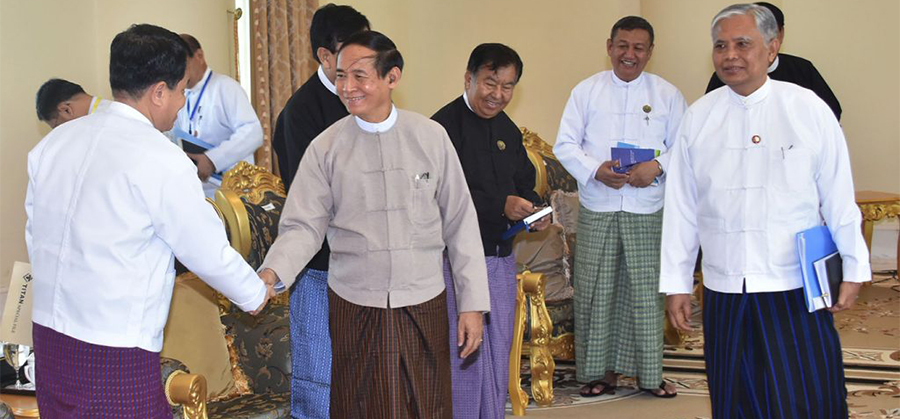YANGON—President U Win Myint has reiterated his commitment to eradicate corruption in Myanmar by promoting transparency, integrity, fairness and the rule of law in the administrative, legislative and judicial branches.
“It is important to remove all the root causes of corruption,” President U Win Myint said on Thursday as he delivered a speech at a virtual event to mark International Anti-Corruption Day.
He said this process would include simplifying laws, rules, orders, directives and regulations that currently cannot be understood by ordinary citizens—a situation that allows law enforcement officers to manipulate them. These measures would be included in the national level anti-corruption strategy, he said.
The strategy is in the planning stages and will be adopted to facilitate a long-term, effective and all-inclusive fight against corruption, he added.
The President said the government has been working to combat corruption with strong political will in recent years.
Local branch offices of the Anti-Corruption Commission (ACC) have been opened to conduct the agency’s work more effectively in closer proximity with people in the regions and states, he said, adding that anti-corruption units have also been established in Union ministries and investigations have been conducted with impartiality in accordance with the law.

According to a report by Transparency International—a global coalition against corruption—Myanmar’s ACC enjoys the highest level of public trust among the corruption watchdogs of 17 Asia-Pacific countries. The report said the commission had demonstrated a strong will to curb corruption by investigating cases involving high-level figures.
In 2019, the commission managed to investigate then-Tanintharyi Region Chief Minister Daw Lei Lei Maw of the National League for Democracy (NLD). In May, she was sentenced to 30 years in prison for bribery. She became the first chief minister and the most senior figure to be charged under the Anti-Corruption Law since the NLD came to office in 2016.
However, Myanmar’s graft agency has no mandate to tackle military corruption, as the military-drafted 2008 Constitution gives the armed forces immunity from external prosecution. The Constitution grants the military the right to tackle corruption within its ranks using internal mechanisms.
“The fight against corruption is [aimed at] the removal of one of the biggest obstacles to the economic development of a country,” President U Win Myint continued in his speech to mark International Anti-Corruption Day.
He urged all responsible personnel from the three branches of government and the public to cooperate in the fight against corruption.
The event was also attended by the Parliament speakers, Union chief justice, Union ministers, chairman of the Naypyitaw Council, chief ministers of states and regions, members of the ACC and officials from the UNODC and UNDP.
Though the current Anti-Corruption Commission’s term does not end until March 2021, its chairman, U Aung Kyi, who won plaudits from the public for his handling of a number of high-profile cases, resigned on Dec. 1. The 74-year-old chairman, a retired major general, said in a Facebook post that he had been preparing to step down for more than a year, adding that he wanted to focus on meditation and would shut down his Facebook account.
You may also like these stories:
Myanmar Defense Minister Tipped to Become VP in New Govt
After Election Victory, Myanmar’s Ruling Party Under Pressure to Get Cabinet Picks Right
NLD Reaches Out to Myanmar’s Ethnic Parties Seeking Federal Union and an End to Civil War

















